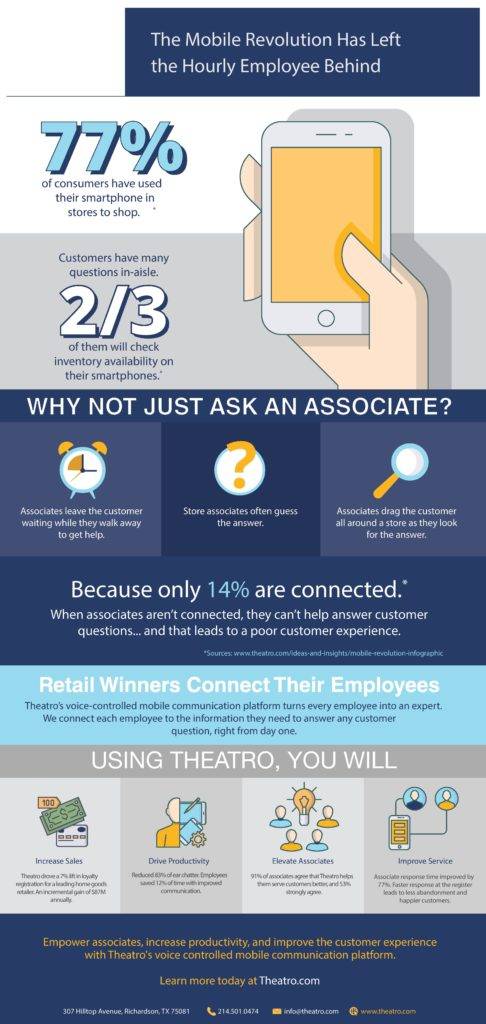The Mobile Revolution Has Left the Hourly Retail Worker Behind
I recently wrote an article that was featured on RIS News: The Mobile Revolution Has Left the Hourly Retail Worker Behind, But Conversational Computing Brings Hope. In the article I discuss how the 4th largest employment sector, hourly in-store associates, has been left behind in this new generation of retail. The mobile revolution has transformed the world by spawning massive productivity gains across almost every sector of the world’s economy. Yet even with this unprecedented wave of innovation, one very large group has been left behind: in-store associates. I’ve got more to add to this article and a helpful infographic that illustrates my point, so I thought I’d blog about it!
Why have hourly workers been left behind?
While the U.S. has shifted to a service-based economy, mobile devices haven’t effectively benefited the growing number of service jobs. There is arguably no sector of our economy undergoing more disruption caused by the mobile revolution than retail. This transformation in retail has created new marketplaces, payment methods and delivery options to service today’s “always connected” customers. Consequently, connected customers have a growing addiction to instant information and an increased expectation of immediate and effective service, especially when shopping in retail stores. These shoppers prefer to access the information they want from their own mobile device, but when they enter a store, they expect retail employees to have access to more information than they could find online themselves. Their desire is to have a frictionless shopping experience in a store, just like they have become accustomed to when shopping online.
Unfortunately, as evidenced by the constant drumbeat of retail chains going out of business, the gap between a connected customer’s expectations and a retailer’s ability to deliver on those expectations is widening. Retailers have been trying unsuccessfully to inject screen-based mobile devices like smartphones and tablets into the hands of store associates for more than five years, but they have not made a notable difference, and the gap continues to widen.
Smartphones and tablets, as a mobile device for most retail associates, have proven to be expensive, prone to theft, and a distraction. This ultimately leads to lower worker productivity, not exactly the panacea that was expected. Customers have been very vocal about poor customer experiences when retailers have tried to use consumer mobile devices. Customers loathe seeing an associate standing in an aisle looking at a mobile screen. No matter the actual purpose, the customer assumes the worker is playing a game or texting with friends. Even when being helped by an associate equipped with a smartphone or tablet, customers will only tolerate them looking at a screen to access information for so long, and only if the resulting information is unique and beneficial. Retail employees need their hands and eyes free to perform their jobs in a service-first world. Many retailers are frustrated and looking for a new, effective solution. With low confidence in available solutions, only a fraction of retailers’ investment priorities are focused on improving employee productivity.
In an employment sector like retail with traditionally high turnover rates (and high associated costs), employees want easy-to-use tools that can make a big difference in productivity and customer service. A recent Salesfloor study found that 72% of hourly retail associates are more likely to stay with a retailer if they have the right technology and resources, and two-thirds said access to digital tools and technology is a must-have at a future retailer. Sad to say, the only mobile tool that has proven to be cost-effective and somewhat useful in retail is the two-way radio, invented in 1939 — and employees hate it. Without a better mobile solution, the role of the associate and the retail store will continue to diminish.
Now, imagine if every store associate was equipped with a mobile communication solution that enabled them to instantly answer any question a customer asked without breaking eye contact. Retail associates would benefit from the explosive innovations in messaging like we are witnessing in consumer and professional enterprise markets where Snapchat, Facebook or Slack are revolutionizing the way we communicate or collaborate with each other. With a mobile platform optimized for the unique requirements of today’s service employees, we would see an endless line of mobile apps created to address specific use cases, resulting in large gains in efficiency and productivity. In this perfect world, not only would service be quick and efficient, retail associates would be able to recognize each customer when they entered a store and personalize each customer’s shopping experience to their individual interests. Based on current trends in retail, this dream seems far-fetched.
Now here comes the part where I offer hope with IoT and Conversational Computing
The convergence of conversational computing and the availibilty of Wi-Fi has enabled us at Theatro to create a new mobile communication solution that empowers the hourly worker. Our goal is to ensure the associates are able to remain “heads-up and hands-free”™, using our Alexa-like voice-controlled solution. In companies that have implemented Theatro, they have seen a drastic improvement in employee response times and improved customer service through instant access to information like never before. While the market continues to evolve, it’s imperative to unlock the full potential of the hourly worker.
Retailers using voice-controlled apps to connect associates to each other and to their critical IT systems are unlocking the full potential of a mobile hourly workforce. Our experience shows users are realizing a 12% labor-savings by streamlining communications and improving associate response times to key customer requests by a whopping 77%. Importantly, 91% of associates agree that using a voice-enabled mobile IoT end point for in-store communications helps them serve customers better; 53% strongly agree.
What’s next?

Intelligent personal assistants, voice-controlled mobile apps and IoT mobile devices create a connected and engaged workforce that is empowered to deliver a truly frictionless customer experience. Instead of being on the defensive to what’s coming next from Amazon and the online eco-system, retailers can leverage a new mobile platform to experiment and innovate new and better ways to compete. With tomorrow’s IoT mobile solutions, retailers and retail hourly workers can finally be in a position to lead with mobile to provide incredible customer experiences while using the most natural form of human interaction, their own voices.
Read more at theatro.com









